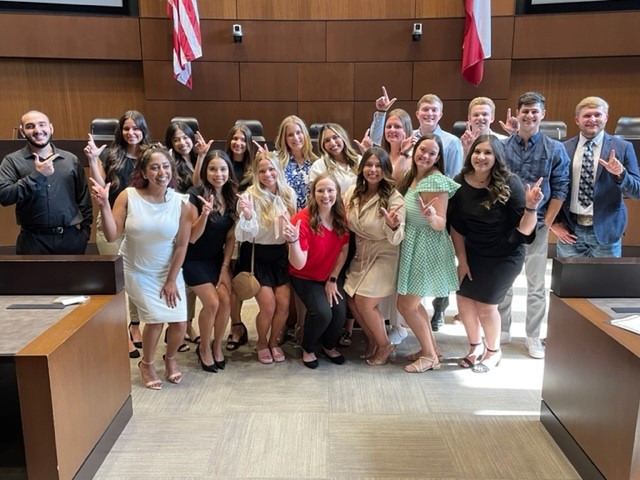TTU Pre-Law Academy
Description and Mission:

Started back in 2013, the Texas Tech University Pre-Law Academy (PLA) is a prestigious summer program for undergraduate students who are interested in attending law school and pursuing a career in the legal field. The mission of the Pre-Law Academy is to prepare students for the competitive law school admissions process and the demands of law school, while also helping students create a vision for themselves as law students and lawyers.
The 2024 Pre-Law Academy is currently full.
The application for the 2025 Pre-Law Academy will be available in late September 2024.
Pre-Law Academy Structure:
The PLA includes the following courses:
1. Argumentation and Debate COMS 3314 (3 credit hours)
2. Lawyering Skills: Legal Analysis & Advocacy PLAW 4301(3 credit hours)
3. Seminar in the Legal Profession PLAW 3101 (1 credit hour)
Students admitted into the Pre-Law Academy must take these three courses during Summer I. All seven credit hours count towards a Legal Studies minor, and students in the Honors College may receive general Honors credit for PLAW 4301. If a student has already taken Argumentation and Debate, the Pre-Law Academy course may be taken as an independent study.
Required Courses:
The following courses are restricted to students admitted into the Pre-Law Academy.
Course 1: Argumentation and Debate
Course Number & Title: COMS 3314: Argumentation and Debate
Course Description: The relationship between rhetoric and law extends back more than two thousand years ago to the beginning of democracy. In ancient Greece, advocates would represent their position before the courts. The roots of that system are maintained today, in the adversarial political and legal system of the United States. This course examines the judicial system and the relationship between rhetoric and law. Students begin by considering classical concepts of rhetoric, including argumentation/reasoning, the use of proofs as evidentiary support, and fallacies in argumentation. Next, they investigate the ways in which the law is rhetorical, which includes how one understands or interprets the United States Constitution. Students will consider different areas of law and the ways in which the argument used to support or to oppose legal outcomes are rhetorical. They also will engage in debates to further their argumentation and debate skills. By the end of this course students should understand their fundamental rights, as well as certain strategies to help them advocate for those rights.
Course 2: Lawyering Skills: Legal Analysis & Advocacy
Course Number & Title: Lawyering Skills: Legal Analysis & Advocacy, PLAW 4301
Course Description: This course introduces undergraduate students to fundamental concepts related to the legal system, including court structure and the types of legal authority. It also introduces them to legal analysis and the format for legal writing and citation. Students write an objective legal memorandum, and this assignment helps them improve their critical thinking and writing skills. In addition, students learn how to give a persuasive oral argument and they demonstrate their advocacy skills in a moot court setting. Upon completion of the Lawyering Skills course, students will demonstrate competency of the following learning outcomes:
1- Identify and describe the structure of the U.S. and Texas legal systems.
2- Identify and describe key rules and reasoning contained within applicable authority.
3- Effectively synthesize and reconcile multiple legal authorities when applicable.
4- Effectively analogize and distinguish precedent.
5- Identify and describe the roles and differing characteristics of sources of law,
including the weight of authority.
6- Use proper citation when required.
7- Engage in effective and professional oral communication, including delivery of
an oral argument.
Course 3: Seminar in the Legal Profession
Course Number & Title: Seminar in the Legal Profession, PLAW 3101
Course Description: This seminar course includes three segments: (1) People in the Legal Profession, (2) Learning from Lawyers, and (3) Getting into Law School.
Segment I: People in the Legal Profession: In this segment, students learn from a variety of groups, e.g. lawyers/judges, law school staff, and law faculty. Topics may include overview of careers in the legal profession, work-life balance and well-being in the legal profession, and other law-related topics.
Segment II: Learning from Lawyers: This segment exposes students to different practice areas and sometimes includes "field trips." For example, students might visit the Lubbock County Courthouse and hear from a judge.
Segment III: Getting into Law School: The goal of this segment is to teach students about getting admitted to law school, preparing for and taking the LSAT, and developing study skills to ensure success as an undergraduate and as a law school student. Some topics include the following: writing a personal statement; choosing the right law school; the cost of law school; choosing undergraduate courses in preparation for law school; and developing strong study skills. As part of this segment, students take a practice LSAT.
University Advising
-
Address
Texas Tech University, 347 Drane Hall, Box 41038, Lubbock, TX, 79409-1038 -
Phone
806.742.2189 -
Email
advising@ttu.edu
